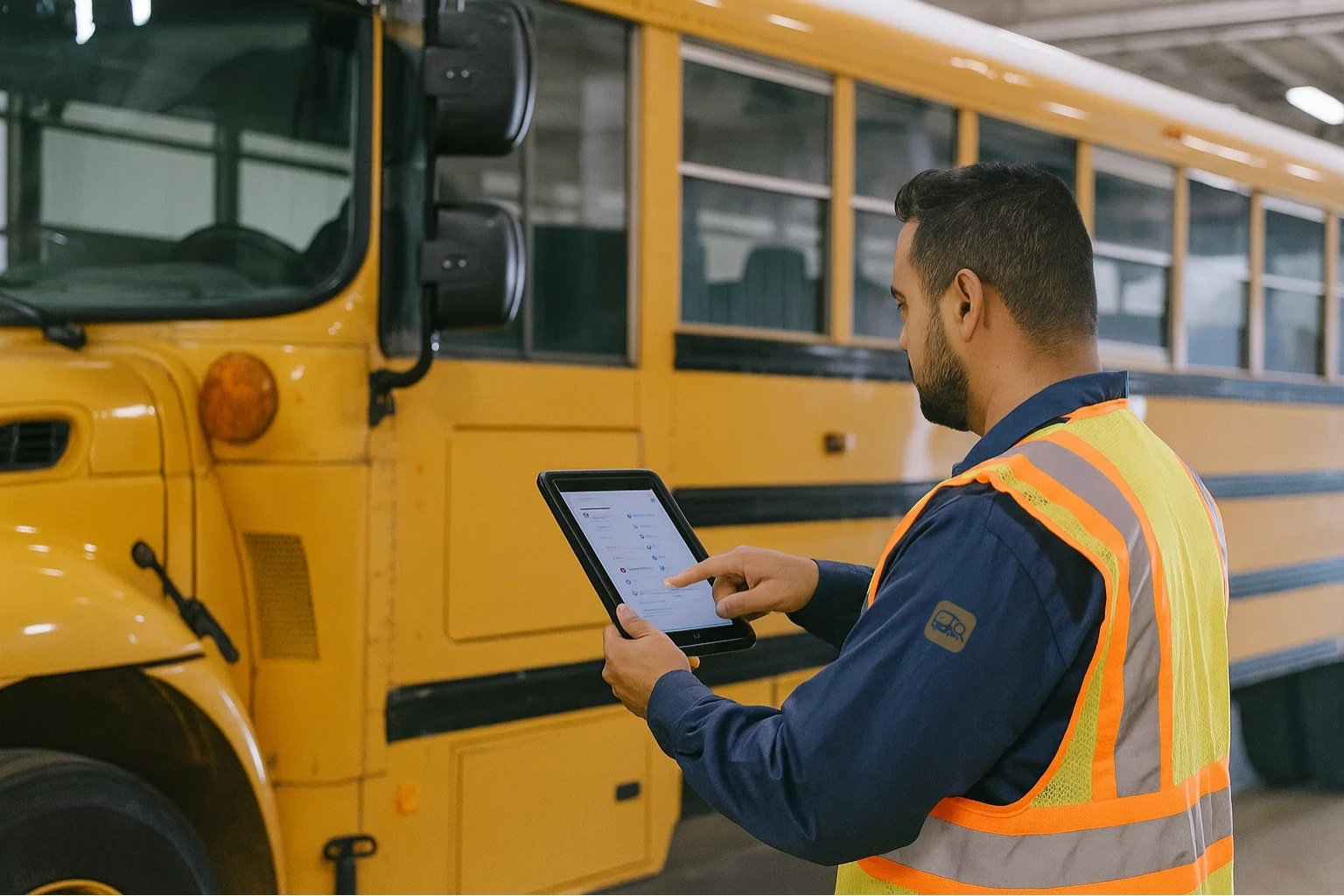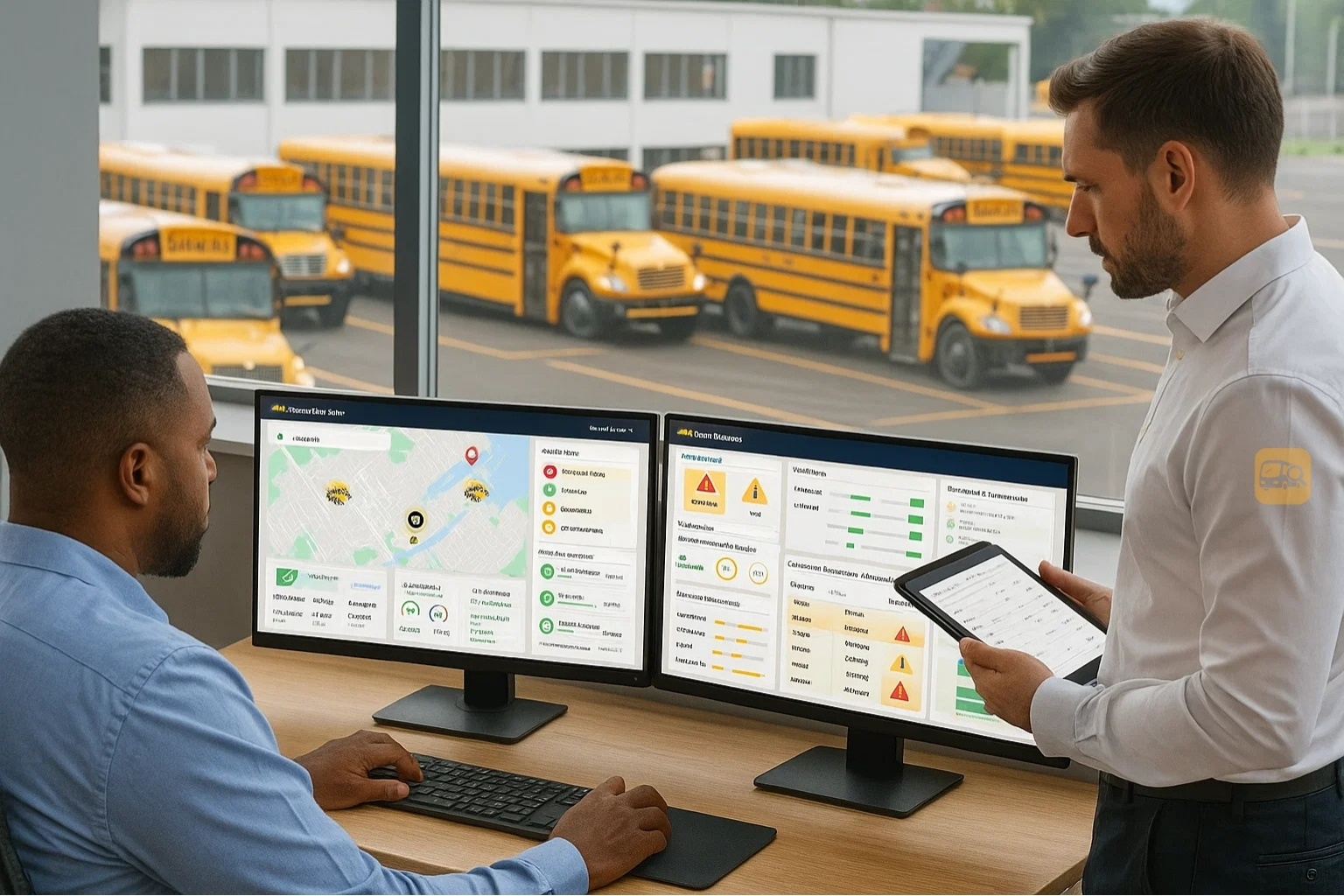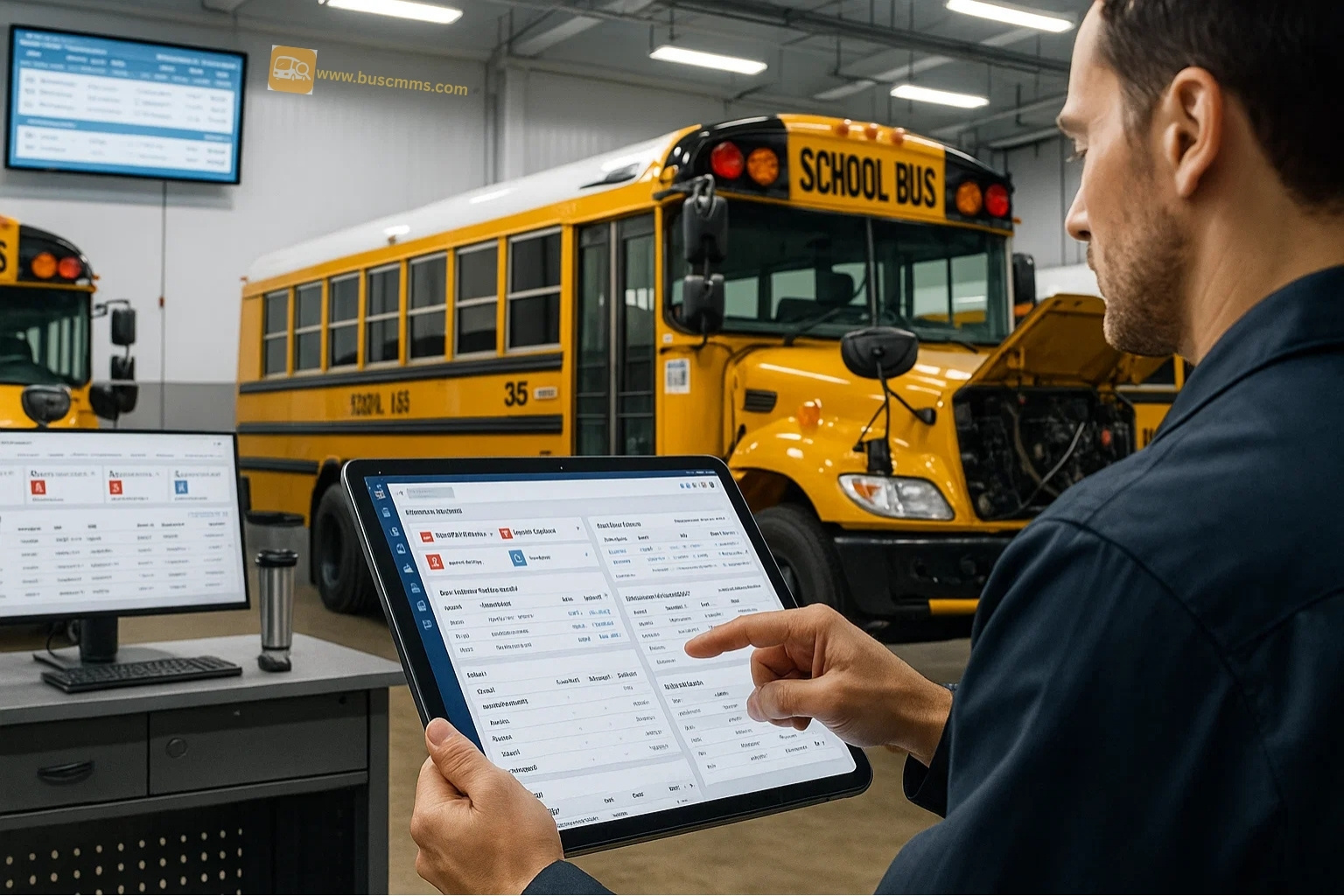In today's competitive manufacturing landscape, efficient transportation is crucial for maintaining operational excellence. Bus fleets serving manufacturing facilities require sophisticated management systems that go beyond basic vehicle tracking. Geotab integration software offers comprehensive telematics solutions that can transform your fleet operations, reduce maintenance costs, and maximize vehicle uptime. This guide explores proven best practices for implementing Geotab integration software specifically tailored for US manufacturing professionals managing bus fleets.
Modern fleet management demands real-time insights, predictive analytics, and seamless integration with existing maintenance software systems. By implementing proper Geotab integration strategies, manufacturing companies can achieve significant improvements in fleet efficiency, compliance tracking and operational cost reduction.
Ready to Transform Your Fleet Management?
Discover how integrated telematics solutions can optimize your bus fleet operations
Getting Started Book a Demo1. Strategic Planning and System Architecture
Successful Geotab integration begins with comprehensive strategic planning that aligns with your manufacturing facility's operational requirements. The foundation of effective telematics integration lies in understanding your current fleet management processes and identifying specific areas where automation and real-time data can drive improvements.
Data Integration Framework: Establish a robust data integration framework that connects Geotab's telematics platform with your existing CMMS tools and maintenance software. This integration enables seamless data flow between vehicle diagnostic systems and your maintenance scheduling systems, creating a unified view of fleet health and performance metrics.
Pro Tip: Manufacturing facilities typically see a 25-30% reduction in unplanned maintenance events when properly integrating telematics data with predictive analytics systems.
Design your system architecture to accommodate future scalability. Consider factors such as fleet expansion, additional manufacturing sites, and evolving compliance requirements. A well-planned architecture ensures that your Geotab integration can adapt to changing business needs without requiring major system overhauls.
Establish clear data governance policies that define how telematics data will be collected, processed, and utilized across different departments. This includes setting up appropriate access controls, data retention policies, and ensuring compliance with industry regulations specific to manufacturing operations.
2. Real-Time Vehicle Health Monitoring
Implementing comprehensive vehicle health monitoring through Geotab integration transforms reactive maintenance approaches into proactive fleet management strategies. Real-time diagnostic systems provide continuous monitoring of critical vehicle components, enabling early detection of potential issues before they result in costly breakdowns.
Engine Performance Analytics: Geotab's diagnostic systems monitor engine parameters including temperature, oil pressure, fuel efficiency, and emission levels. For manufacturing bus fleets, this data is crucial for maintaining optimal performance during shift changes and peak operational periods. Integration with your maintenance software automatically generates work orders when parameters exceed predetermined thresholds.
Advanced diagnostic capabilities extend beyond basic engine monitoring to include transmission health, brake system performance, and electrical system integrity. This comprehensive monitoring approach is particularly valuable for bus fleets operating in demanding manufacturing environments where vehicle reliability directly impacts workforce transportation and operational continuity.
Predictive Maintenance Integration: Combine Geotab's real-time data with predictive analytics algorithms to forecast maintenance needs based on actual vehicle usage patterns, environmental conditions, and historical performance data. This approach significantly reduces unexpected vehicle downtime and optimizes maintenance resource allocation.
Key Benefits: Manufacturing companies implementing comprehensive vehicle health monitoring report up to 40% reduction in emergency repairs and 35% improvement in fleet availability during critical operational periods.
3. Maintenance Scheduling and Workflow Optimization
Effective maintenance scheduling through Geotab integration ensures optimal vehicle uptime while minimizing operational disruptions. Advanced scheduling systems consider multiple variables including vehicle usage patterns, maintenance history, parts availability, and operational requirements specific to manufacturing environments.
Automated Work Order Generation: Configure your integrated system to automatically generate maintenance work orders based on real-time telematics data, predetermined maintenance intervals, and predictive analytics insights. This automation eliminates manual tracking processes and ensures that no critical maintenance tasks are overlooked.
Implement dynamic scheduling algorithms that optimize maintenance timing based on operational requirements. For manufacturing bus fleets, this means scheduling maintenance during off-shift periods or planned downtime to minimize impact on workforce transportation schedules.
Parts and Inventory Management: Integrate Geotab data with your inventory management systems to enable proactive parts ordering based on predictive maintenance forecasts. This integration ensures that required parts are available when needed, reducing vehicle downtime and maintenance delays.
Develop comprehensive maintenance workflows that incorporate approval processes, technician assignments, and quality control checkpoints. These workflows should be flexible enough to accommodate emergency repairs while maintaining proper documentation and compliance requirements.
4. Fleet Efficiency and Route Optimization
Route optimization through Geotab integration delivers significant operational improvements for manufacturing bus fleets by reducing fuel consumption, minimizing vehicle wear, and improving service reliability. Advanced routing algorithms consider real-time traffic conditions, vehicle capacity, and operational constraints to optimize fleet deployment.
Dynamic Route Planning: Implement dynamic route planning capabilities that automatically adjust routes based on real-time conditions including traffic congestion, weather conditions, and unexpected operational changes. This flexibility is crucial for manufacturing environments where shift schedules and transportation demands can change rapidly.
Geotab's fleet insights provide comprehensive analytics on route efficiency, fuel consumption patterns, and driver performance metrics. These insights enable continuous optimization of transportation services and identification of opportunities for operational improvements.
Performance Monitoring: Establish key performance indicators (KPIs) that measure route efficiency, on-time performance, and fuel consumption. Regular analysis of these metrics enables identification of optimization opportunities and measurement of improvement initiatives.
Operational Impact: Manufacturing facilities implementing comprehensive route optimization typically achieve 15-20% reduction in fuel costs and 25% improvement in on-time performance for employee transportation services.
5. Compliance Management and Reporting
Compliance tracking through Geotab integration ensures adherence to federal, state, and local regulations while providing comprehensive documentation for audits and regulatory reporting. Manufacturing bus fleets must comply with various safety, environmental, and operational regulations that require detailed record-keeping and reporting capabilities.
Automated Compliance Monitoring: Configure automated compliance monitoring systems that track driver hours, vehicle inspections, maintenance records, and safety performance metrics. These systems generate alerts for potential compliance issues and maintain comprehensive audit trails for regulatory reporting.
Implement comprehensive reporting capabilities that provide real-time visibility into compliance status across your entire fleet. These reports should be customizable to meet specific regulatory requirements and provide drill-down capabilities for detailed analysis.
Safety Performance Management: Utilize Geotab's safety features including driver behavior monitoring, accident reporting, and safety training tracking. For manufacturing bus fleets, maintaining excellent safety records is crucial for protecting employees and maintaining operational licenses.
Establish regular compliance auditing processes that leverage integrated data to identify potential issues before they become regulatory violations. Proactive compliance management reduces the risk of fines, operational disruptions, and reputational damage.
Maximize Your Fleet's Potential Today
Join thousands of manufacturing professionals who have transformed their fleet operations with integrated telematics solutions
Getting Started Book a DemoConclusion
Implementing Geotab integration software for bus fleet management represents a strategic investment in operational excellence for manufacturing facilities. The best practices outlined in this guide provide a comprehensive framework for maximizing the benefits of telematics integration while addressing the unique challenges faced by manufacturing professionals.
Success with Geotab integration requires careful planning, systematic implementation, and ongoing optimization based on performance data and operational feedback. Manufacturing companies that follow these best practices typically achieve significant improvements in fleet efficiency, maintenance cost reduction, and operational reliability.
The future of fleet management lies in intelligent integration of telematics data with advanced analytics and automation systems. By implementing these best practices today, manufacturing professionals can position their organizations for continued success in an increasingly competitive marketplace while ensuring reliable transportation services for their workforce.
Ready to transform your bus fleet management? Start by evaluating your current systems and identifying integration opportunities that align with your operational objectives. The investment in proper Geotab integration will deliver measurable returns through improved efficiency, reduced costs, and enhanced operational reliability.
Frequently Asked Questions
Implementation timelines vary based on fleet size and complexity, but most manufacturing facilities complete Geotab integration within 4-8 weeks. This includes initial setup, data migration, staff training, and system optimization. Larger fleets or complex integration requirements may extend the timeline to 12 weeks.
Key ROI metrics include reduction in unplanned maintenance costs (typically 25-30%), improved fuel efficiency (15-20% savings), increased vehicle uptime (35-40% improvement), and reduced compliance violations. Most manufacturing facilities see positive ROI within 12-18 months of implementation.
Yes, Geotab offers robust API capabilities and integration tools that connect with most existing CMMS and maintenance management systems. The platform supports real-time data exchange, automated work order generation, and seamless workflow integration with popular maintenance software solutions.
Geotab assists with DOT regulations, driver hour-of-service compliance, vehicle inspection requirements, emission standards, and safety reporting mandates. The system provides automated tracking, alert generation, and comprehensive reporting capabilities to ensure regulatory compliance.
Predictive maintenance leverages real-time vehicle data and analytics to forecast maintenance needs before failures occur. This approach typically reduces emergency repair costs by 40%, extends vehicle lifespan by 20-25%, and minimizes unexpected downtime that disrupts manufacturing operations and employee transportation schedules.








